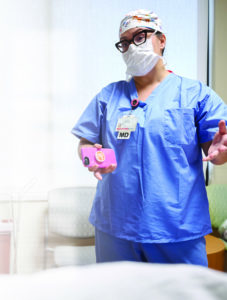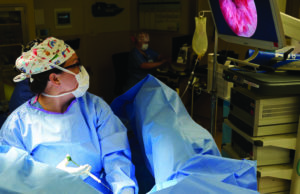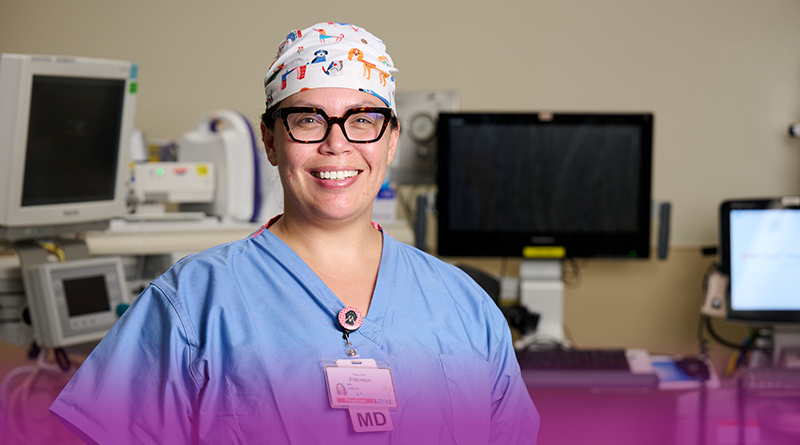
LOUISVILLE The field of urogynecology is one of the lesser-known specialties—among both medical professionals and the general public—which means many of the women who need it most are unaware that help exists. Marjorie Pilkinton, MD, OB-GYN, FACOG, is on a mission to change that.
“I meet patients today, women in their 60s, 50s, and even 40s, who think they just have to suffer in silence because no one is talking about these conditions. Women suffering incontinence, prolapse, or pain don’t realize they don’t have to live that way, that there are options,” says Pilkinton, a board- certified urogynecologist at Norton Medical Group.
Initially, Pilkinton herself was not knowledgeable of the field, much less focused on making it her life’s work. In college, during a work study program with Centre College’s athletic department, she homed in on pursuing either sports medicine or orthopedic surgery. Upon entering medical school at the University of Louisville School of Medicine, she was still single-minded and right on track. Then, third year clinicals began and changed everything. Pilkinton chose to complete the GYN rotation first, just to get it over and done with. She says, “I started with gynecology thinking I would just get that done and move on, because that was the one rotation that I thought I would be least interested in.”
That all changed during her first day on general GYN service in the clinic when a woman in her 50s admitted that gynecological issues, not related to pregnancy, were dominating her life.
Pilkinton explains, “She was a waitress, and she came in stating that she could no longer work her job because she had developed a large prolapse. And that was true. And to see her through her course of evaluation and discuss with her how it negatively affected her quality of life and affected her job and affected how she felt as a woman. It was very insightful. Nobody talked about these conditions.”
“I meet patients today, women in their 60s, 50s, and even 40s, who think they just have to suffer in silence because no one is talking about these conditions.”Marjorie Pilkinton, MD
This encounter made Pilkinton realize there was “This whole other side of GYN beyond what I knew, which was your annual exam.”
So, upon receiving her medical degree from UofL, Pilkinton went on to a residency in OB-GYN at Mount Sinai West in New York City and a fellowship in urogynecology at Northwell Health, also in New York.
The Scope of Urogynecology
As for the field of urogynecology, Pilkinton states, “It broadly covers pelvic floor disorders that a woman may experience either related to, or completely unrelated to, childbirth. But childbirth tends to be a big factor in the development of a lot of these disorders. So, it can range from protruding organs, to fecal or urinary incontinence, to pain with the bladder, vagina, or rectum, to sexual dysfunction.”
As a leading provider of urogynecology in Louisville and Southern Indiana, Norton Healthcare offers a wide range of services, including treatment for the scope of urinary disorders, uterine disorders, prolapse, pelvic floor disorders, sexual dysfunction, or voiding dysfunction. Each of these conditions negatively impacts quality of life. Pilkinton states, “There is this real opportunity here to offer a special type of care to patients, which is just how to live a happier, healthier, and more fulfilling life.”
Pilkinton sees women of all ages with a wide range of complaints. Patients come to her through self-referral, primary care referral, and occasionally referral from their OB-GYN. Often, these are women in the perimenopausal period, which is typically around 50, when changes in hormones bring on other changes, many of which are uncomfortable and require surgical intervention. However, she has performed pelvic reconstructive surgery on patients as young as 27.
A large part of Pilkinton’s focus is on reconstructive surgery, which is very specific in the context of her practice. She states, “Reconstruction essentially means reconstructing prolapsed organs—fixing bladder and vagina prolapse along with rectal. Essentially, just placing a woman’s pelvic organs back where they’re supposed to be.”
Pilkinton also collaborates with oncologists for patients who have prolapses in conjunction with gynecological cancers. Patients are eager to have both surgeries at one time and move on.
According to Pilkinton, “She’s thrilled to get it all done in one day. That’s all she wanted. She just wants to get better and not have to think about her vagina. I say that all the time in the office, ‘Let’s just get you better. So you don’t have to sit and think about this all the time; nobody wants to think about their vagina 24 hours a day.’”
Four to six weeks after surgery, patients are assessed for their progression and degree of symptom relief. At this point, if there are lingering issues or if she believes it will aid in their recovery, pelvic floor physical therapy is recommended. According to Pilkinton, “It’s so commonplace to go to physical therapy after you get your knee replaced, or your shoulder operated on. It’s not so common for women to be aware of pelvic floor physical therapy for urinary, rectal, and vaginal issues.”
For women who want to avoid the issues that would lead them to Pilkinton’s office, she stresses awareness and early intervention with physical therapy soon after delivery. “It is important to understand that delivery does cause muscular damage, and potentially nerve damage as well, to the pelvic floor. I think the earlier the better, especially after delivery.”
New Technology for Female Pelvic Health
Technological advances have also led better outcomes and better quality of life for women, specifically those struggling with urinary issues.
One such device is the Medtronic InterStim™ sacral neuromodulation system, which improves urinary urgency and urinary incontinence as well as fecal incontinence through stimulation from a wire that is placed through an opening near the pelvic nerve that feeds the bladder and the pelvic floor. Pilkinton says, “We’ve seen great benefit in patients who actually struggle to urinate and for people who are retaining urine. This can actually improve their ability to urinate more normally. So, it’s a wonderful device. And it’s been around for several decades.”
However, the newest innovation is in battery life. The newest InterStim battery can last up to 15 years, with maintenance charging on the part of the patient.

Another innovation is Bulkamid®, a newly FDA-approved urethral bulking injection that treats stress urinary incontinence. This water-based gel is in injected into the wall of the urethra to assist the sphincter, allowing it to close more naturally.
Just as many women are not aware of pelvic floor physical therapy or these latest advances, many are not attuned to the causes of pelvic floor problems. Issues can result from things as commonplace as constipation and consistent straining during bowel movements. “It’s amazing how many people feel like having one bowel movement a week is a very normal thing, and even how much work it takes to have that one bowel movement. It may be their normal, but that’s not normal. And it does take a toll on the pelvic floor,” states Pilkinton.
Another factor is obesity, which increases the risk for many issues and decreases the effectiveness of results from these surgical procedures. Pilkinton says, “We’re understanding more and more how weight can affect the pelvic floor as well, and, and how weight can impact the results of surgery.”
Education, Empathy, and Empowerment
When it comes to urogynecology, the biggest issue is lack of education on the topic.
“There are not many groups educating women about their pelvic floor, but the majority of women are dealing with their pelvic floor to some degree, day in and day out. And the idea that you just have to suffer in silence, I don’t think has to be the way of life anymore.” Pilkinton makes it her personal mission to educate each of her patients on their bodies to help them become more aware of potential problems. She says, “If a patient can walk away from the visit understanding what they’re experiencing, versus me just throwing out different diagnoses, it hits home a lot better. So, education is a big part.”

Along with education, Pilkinton employs equal parts empowerment and empathy. With a firm focus on empowering the women she treats, Pilkinton takes a more collaborative and collegial approach, “I treat them and see them as if they were me, sitting in that chair, or my grandmother, my aunt, my mom. I try to remind the staff that this is somebody who could easily be you one day, because we’re all women in our office. I think our office does a great job of really trying to provide personal empathetic care.”
Pilkinton often hears, “I just I don’t know why I waited so long. I just did not even realize how long I had been suffering.” These words are bittersweet. However, when this same patient can pinpoint different aspects of their life that have been positively impacted from treatment and voice how their confidence and comfort have been renewed, it makes it all worth it.


